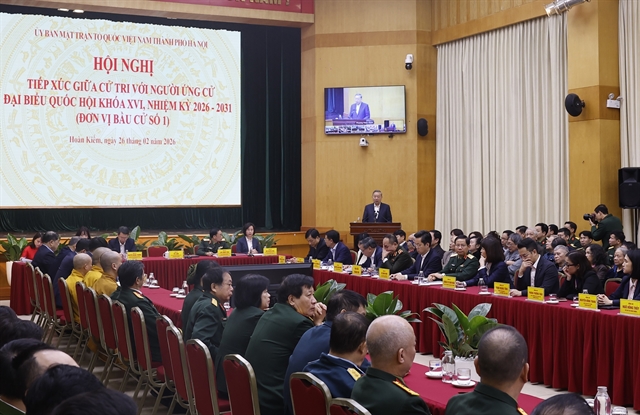 Economy
Economy

Compiled by Thiên Lý
Banking sector insiders expect deposit interest rates to only see slight changes this year.
According to VnDirect Securities Company, in May small private banks hiked deposit interest rates by 3-4 per cent but not large ones.
It took until June for the race to begin in earnest and the rest to join.
Vietcombank, the country’s largest lender, increased interest rates on deposits of less than 12 months by 0.2 percentage points, which brought them, until then the lowest in the industry, on par with those offered by other state-owned banks.
Analysts said since June COVID-19 vaccination programmes have been undertaken nation-wide, bringing hope that the pandemic would soon be controlled and economic activities would recover, which would increase demand for credit.
It is in anticipation that banks have started increasing their deposit interest rates hoping to mobilise funds when they are still cheap and before competition drives them up.
VnDirect also said it is unlikely the deposit interest rates would come back down any time soon due to rising inflation caused by higher global fuel prices and the economic revival. The central bank too is wary of inflationary pressure and is careful about policy loosening.
Besides, with the securities and real estate markets posing a strong challenge as investment classes banks cannot but keep deposit interest rates at attractive levels.
Another reason to keep rates high is that liquidity is likely to become an issue since many businesses are in a difficult situation due to the effects of COVID and unable to repay bank loans on schedule. Many have been allowed to delay repayment by the Government, and bad debts are expected to rise.
Yet, analysts are confident it is not the start of an interest rate race, and the increases would be only 25-30 basis points in the second half of the year.
In the last five years or so the central bank has carefully regulated deposit interest rates.
Speaking about the likely trends in the remaining months of the year, Dr Nguyễn Đức Độ, deputy director of the Economic-Finance Institute, said how much interest rates increase would depend on several factors like the recovery of the economy and inflation at home and globally.
Central bank reduces foreign currency buying
Recently the State Bank of Việt Nam (SBV) reduced its US dollar buying rate for six-month forward contracts by VNĐ150 to bring the greenback’s exchange rate against the đồng to VNĐ22,975.
It also reduced the daily reference price for the dollar by 0.04 per cent to VNĐ23,130. Banks can trade at up to 3 per cent on either side of this rate.
State-owned Vietcombank’s dollar buying rate fell by 0.44 percent as a result to VNĐ22,830.
The SBV also decided not to allow banks to cancel forward exchange contracts, meaning that those that have planned to sell dollars to it even when the dollar depreciates.
Forward contracts are signed between two parties to trade a pair of currencies at a specific time in the future, and used to protect the buyer from fluctuations in currency prices.
The question is if the central bank’s reduction in the buying price of the greenback suggests it is no longer seeks increase its foreign exchange reserves.
Việt Nam’s dollar inflows through foreign direct investment, inward remittances, and mergers and acquisitions have all increased in the last period.
For instance, in April VPBank signed an agreement to sell a 49 per cent stake in its FE Credit to Japan’s Sumitomo Mitsui Finance Group for US$2.8 billion.
In the same month Korea’s SK Group signed an agreement with Masan Group Corporation to acquire a 16.26 per cent stake in the latter’s subsidiary VinCommerce for $410 million.
Vietnamese fintech and insurtech MoMo raised over $100 million through a new series D funding round.
In the first five months of this year foreign businesses invested around $7.15 billion in the country.
A spokesperson for the central bank’s HCM City branch said in the first five months overseas remittances to HCM City was $3.2 billion in the first six months of this year, account for (hcmc remittances not pertinent to story, an year on year of 22.34 per cent, accounting for over 30 per cent of the country’s total.
Clearly, dollar flows into the country have been rather plentiful, which partly explains why the central bank has reduced dollar buying.
What impact does the reduced buying have on enterprises?
Analysts said this would obviously mean that a majority of the foreign exchange coming from exports, FDI and overseas remittances would remain in the market, and benefit business activities.
It would also help ease the pressure on exchange rates during the rest of the year. Businesses’ demand for foreign currency typically spikes towards the end of the year.
Another benefit is that it will help ease inflation, which also rear its head in the latter part of each year as consumer demand rises sharply.
A stronger Vietnamese đồng will make imports cheaper and stimulate consumer demand.
But on the flip side, the analysts said, the central bank’s reduction in foreign exchange buying would affect the liquidity it provides banks at a time when demand for it is at its peak. VNS




